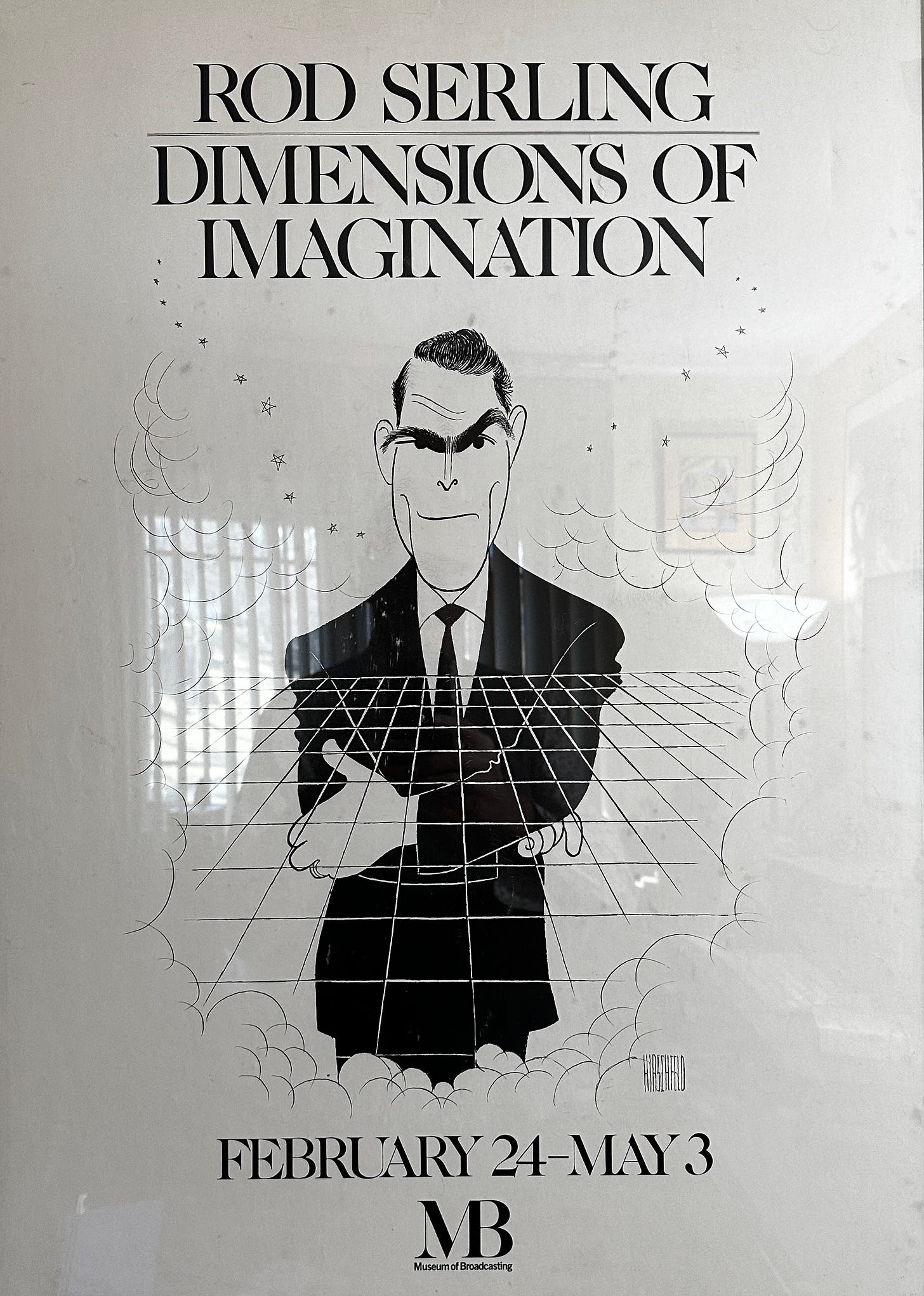Every episode of Into the Storymaze = writing ideas or writing-in-progress; something creative I’m excited to share; a highlight from my comic book writing; a quote that’s worth a think.
My supernatural road trip comic is in prelaunch on Kickstarter. Please give it a look! tinyurl.com/axlesinfernal
From my old “Street Writers” podcast…
Dan: There’s a Rod Serling interview that got in my head. I must be living in a Twilight Zone episode, which is a fine place to be.
This came out of a discussion he was having with students, lo many years ago. And it's a little related dialogue think. It's a dialogue test almost. Ask yourself two questions as a writer when you're writing dialogue.
The first question is, “Would I say it?” And the second question is, “If I heard it, would I believe it?” And that's it.
Mark: Nice.
Dan: And the first part of it, “Would I say it?” I take as not meaning would I say it myself — but would my character say it? Or maybe would any human beings say it?
We purposely didn't include a section on the podcast called “We'd like to beat it to a pulp…” — because you could really go down the road of things that are awful in terms of writing. I saw the Mortal Kombat movie, God knows why last week. And they had a woman who was supposed to be a seal team expert, a military professional.
I think her name must have been Major Exposition because at one point she just comes out and says, “Well, I was on mission in Kandahar. I came across a cave with these carvings on the wall, which illustrate the fighters from across time and dimension who are in some epic confrontation and” — on and on.
Not that a character like that couldn't reveal those details. But that Serling dialogue test of, ”Would I say it? And if somebody heard it, would they believe it?” — a complete and epic fail. So those are the moments I think you just test yourself out with dialogue — and it's an easy one. And if it's there — great!
Mark: So that to me is the process of writing. If you stick with this ridiculous thing as a hobby or craft or profession, or some combination there, you're always going to start from your own inner voice.
It's literally that's what Rod said, “Would I say it?”
Then you evolve. I think if you're true to yourself here, you evolve. And that becomes, like you said, Dan, “Would the character I created say it?” And that's a key distinction. And what that requires is you being so invested in that character and doing all that work that will never show up in the dialogue, but knowing that character so well that you can then use that statement, “No, no, no, this bell hop from Pakistan would never say that!”
That character is you. He's inside you or she's inside you, but you have to do that work in order to get to that point. So it's a simple statement and it works great if you're doing a soliloquy or a monologue or about your life. Or it's an event that happened in your life, which we all do.
But if you're going to take that and make that a basis of what really happens, you have to know that character that you've created so well that a red flag goes up. Because like you say, someone didn't know this character from Mortal Kombat, because — nobody would say that.
Dan: No human being might even say that. There's marbles in the mouth. The words just don't flow together.
And it just sounds like, “We’ve got to cover this off. I'm just going to have this character say it in a way that is almost… bullet points of something.” I think you've got to believe that the ear could actually hear it.
Mark: Obviously it's all coming from you the writer. So you're covering both of those bases. The first question, “Would I say it?” has to expand out — if it's not a biography about you — it has to expand that to this character you created. And then you're giving the words. But the second half is, that other personality in you has to hear it.
That's where the red flag comes up. “Nah!” This fighter pilot from 3030 would never say that. Well, you have to have built that character so that you would know that. And if you don't do the work, you end up with that Mortal Kombat. That's the problem.
And Stephen King mentioned that in his book, On Writing as well. That idea of the dialogue sounding so expository that you're, “Why did you put this in?”
Dan: The Serling test.
Shrinking on Apple TV is positively sublime: a wonderful ensemble cast against a backdrop of a therapy practice, with deeply human hurts and triumphs woven through their issues and support for one another. It’s rat-a-tat funny: the dialogue is razor sharp and unique to each character — with even (what seem to be) minor caricatures regularly elevated to meaningful people. I ached for more at the end of each season.
And Harrison Ford? Don’t get me started: why hasn’t this man’s grumpiness been channeled more for comedy on a regular basis? (Balanced out by so many note perfect dramatic choices — from him and everyone in the cast.)
One of my fave memories from last year’s conventions was this surprise visit at the Hershey Comic Con from Phil Perich and Lilith Hellfire — cohosts of many a’ podcast, including the oddly titled “Chichester Chats.” They co-opted my name and then kindly invited me on what’s turned into a delightful once-a-month, multi-year retrospective of my comic book credits.
In doing so, they’ve forced me crack the cover on a host of comics I’d chosen to ignore or had never properly revisited after I authored them — in effect, a Storymaze if ever there was one. It’s been an education and important self-(re)assessment of what I managed to achieve as a writer. (Maybe they should retitle it “Chichester Therapy”?) \
They’re easy-going, conversational hosts with a passion for comics across the board, and I encourage you to give their in-depth shows a listen. Find their extensive network at https://www.youtube.com/@CapesandLunatics/podcasts
(And def check out the Hershey Comic Con when it rolls around in the summer months. I loved how it mixed together established talent with vendors and up-and-comers for a surprising mix and match of fans, creators and makers.)
“How do creative geniuses come ups with great ideas? They work and edit and rewrite and retry and pull out their genius through sheer force of will and perseverance. They earn the chance to be lucky because they keep showing up.” — James Clear
Amazing Times
If D.G. Chichester looks pretentious, feel free to just call me “Dan”, and have a go at the last name as Chai (like the tea) Chester (like it looks). I’ve written comic books like Daredevil, Terror Inc., Nick Fury Agent of SHIELD and Clive Barker’s Hellraiser, along with all manner of digital widgets in the world wide web of marketing. I like weird tales, so if things here bend that way — now you know why!
Folks seem to like the comic book adventures I’ve written, so if you haven’t checked one out — please do. Many are now available in fab collected editions.
For between newsletters…












Excellent post Dan. Love the tips from Rod Serling and you and Mark. 🙏